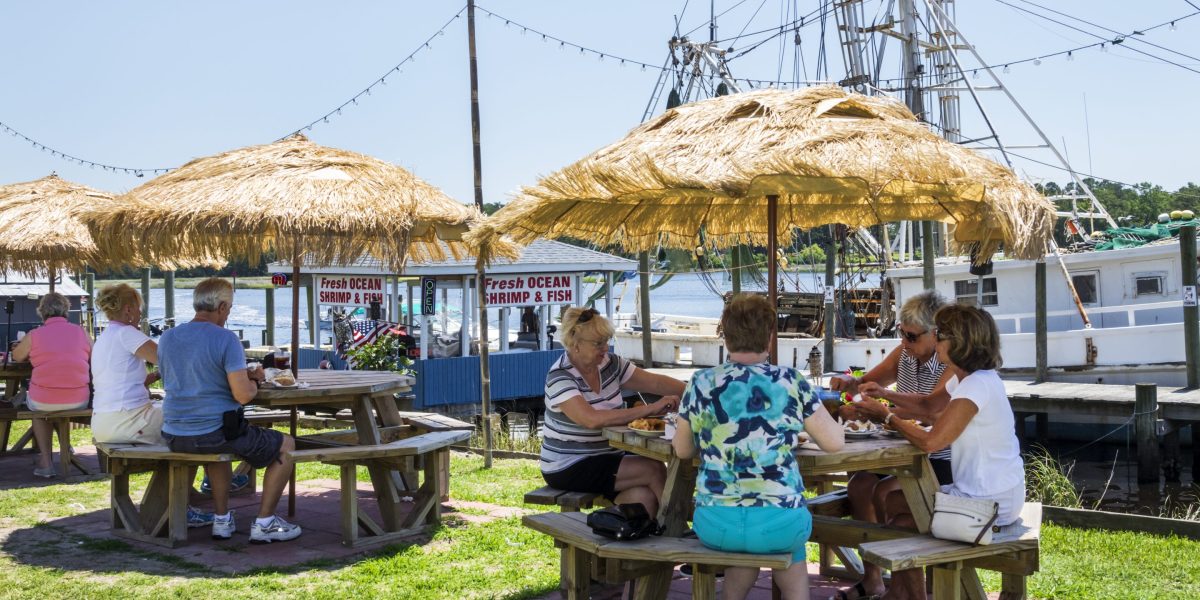

Across the Atlantic, residents in a little-known State are toasting Steins in German beer halls, enjoying bratwurst and schnitzel in Bavarian restaurants, and working for giants like Siemens and Schott Pharma. They have a surprising share of German immigrants to thank.
North Carolina, an east coast state with a relatively attractive six-hour time difference from mainland Western Europe, has long been an attractive destination for businesses from Europe and other regions. But there has been renewed attention from Germany in recent years.
German firms significantly nearly tripled their investments in the U.S. last year. The $15.7 billion splurge resulted from Germany’s flatlining domestic economy, incentives flowing from Joe Biden’s Inflation Reduction Act, and a pivot away from Germany’s long-standing trade dependence on China amid geopolitical tensions and an economic slowdown there.
Much of that has flowed to North Carolina, where German giants like Siemens, Daimler Trucks, and Schott Pharma have each invested hundreds of millions of dollars in recent years. Some 109 German companies have invested more than $2 billion in North Carolina over the last decade.
Even the NFL franchise Carolina Panthers, based in the North Carolina capital of Charlotte, will get in on the partnership when it plays the New York Giants in Munich in November, transforming long-standing business links into cultural ties.
North Carolina’s 2.5% corporation tax is set to be phased out entirely by 2030, attracting foreign businesses to the State.
But Anders Victor, director of business development at the Economic Development Partnership of North Carolina (EDPNC), points out the relationship goes back to the 1700s when German settlers migrated south from Philadelphia and settled in the state.
“It’s a multi-century relationship that we have with German expats, and it manifests now as a very organized and passionate community,” Victor said.
North Carolina’s 2.5% corporation tax is set to be phased out entirely by 2030, attracting foreign businesses to the State.
But within that thriving direct investment is an engine of German expats and their offspring bringing a quirk to the State’s workforce. More than 15,400 Germans have immigrated to the State since 2017.
Siemens helped inspire a surging apprenticeship program in North Carolina, which has grown in popularity across the U.S. as the value proposition for a college degree declines. Colleges and universities in the State also provide German companies with a skilled local workforce in life sciences.
The outward perception shows a win-win for German immigration to North Carolina.
‘Paradise’
Hans Hilgenstock moved to North Carolina in 2004 after relocating from San Diego. Initially planned as a short-term move, he quickly fell in love with the State and its bulging German diaspora.
Hilgenstock led a somewhat nomadic life before settling in North Carolina. He grew up in several parts of Germany before moving to the U.S. in 2001.
“I moved here thinking I’m going back to paradise [San Diego], and I stayed because this is paradise, and it’s not just paradise, because everything is perfect. I have everything in front of me.”
Hilgenstock says he speaks about 80% English and 20% German day-to-day. He works as a logistics salesperson during the day and interacts with a German and English-speaking community in his downtime.
There is a swathe of German restaurants and traditional beer halls in the State. Hundreds of people will attend these beer halls on Fridays at 4 p.m., a sign of the traditional European approach to work-life balance making its mark in the U.S.
“You could take this up, even to Germany, it would be packed,” Hilgenstock says of the beer halls in North Carolina.
Hilgenstock’s kids even attended Deutsche Schule Charlotte, the only German language school in the State.
In the business world, Hilgenstock has noticed more of a divergence that can take the typical German some time to get used to. One is the culture of meetings.
With German companies, calls are limited to 30 minutes and focused on the transaction.
“You can talk about rates, you talk about cost, you talk about the product, talk about service, whatever it is, you talk.
“In America, I know when I have the same one-on-one, I will block two hours because it can last two hours. You talk about kids, family. You get to know the person, and it’s not so focused on the sale.”
‘The wrong president’
Since 2016, the U.S. political environment has grown increasingly toxic, as three different Democratic candidates ran against Republican and former President Donald Trump.
Trump’s return for another crack at the Presidency has left Americans making alternative plans for where they may live after November 6.
A record number of ultra-high-net-worth and high-net-worth individuals in the States are applying for second passports as a safety net against the prospect of civil turmoil due to the U.S. political landscape, with many looking across the Atlantic.
Visa and second passport experts in Europe began noticing a spike in inquiries from Americans last year. Some told Fortune the prospect of a Trump second term forced them to look for properties in Spain and Portugal.
Montreal-based immigration experts Moving2Canada say inquiries from Americans about relocating north tripled after President Joe Biden’s disastrous debate with Trump.
When Hilgenstock first moved to the U.S. in 2001, he was confident the outcome of an election had little impact on people’s everyday lives. That has slowly changed in the last couple of decades.
“With Obama, that was the first time that I’ve seen in the media, people questioning the president, questioning: ‘Is he black? Is he white? Is he Muslim?’ It was crazy. Then, we had an ex-president. Very controversial, didn’t care about allies, did some things which were good, some were not so good,” Hilgenstock said.
He spoke to one German couple who decided to pull out of a move to the States owing to the prospect of a Trump presidency.
“They didn’t want to live here with the wrong president.”
Hilgenstock says foreign companies in the U.S. are also concerned about their investments. They are rushing to complete investments in the State, fearful of reports of significant import tariffs being introduced by a new Trump administration.
State elections also beckon, with a new governor set to be elected in North Carolina in November.
The EDPNC’s Anders said: “Whatever happens at the federal level impacts 50 states at the same time, and probably a lot of people around the world.
“We as a state have a track record and a history of being relatively moderate, and I think I can’t envision drastic changes to how the state governs itself based on our state elections.
Hilgenstock wants Americans to get a passport and see more of the world. Meanwhile, he wants Germans to realize their roots aren’t as locked into the country as they may think and explore the opportunity to work elsewhere.
A new wave of younger Germans may help drive more expats to flow to his “paradise” of North Carolina.















